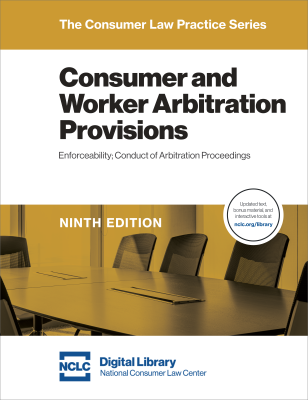On May 5, the Consumer Financial Protection Bureau (CFPB) proposed a rule to prohibit contracts that have arbitration requirements unless the contract includes a notice that class actions are not affected and may be brought in court. See § 1040.4(a). The proposal at § 1040.4(b) also requires that providers submit to the CFPB certain information concerning any individual arbitration proceeding in which they are involved.
The full 106 page proposal from the Federal Register is found here and a 13 page NCLC reprint of just the proposed rule and official interpretation is found here.
When enacted, this rule will be one of the most important consumer developments in decades. It would allow consumers once again to fully utilize class action procedures in court cases involving financial products and services. Additionally, although the proposed rule does not prohibit companies from requiring individual arbitration, it promises some collateral benefits for consumers in that area. Some companies include forced arbitration clauses primarily to prevent consumers from bringing class actions. With that possibility no longer available, some companies may give up arbitration altogether.
Reasons Not to Get Too Excited Just Yet
This is a proposed rule and there is much that could happen before the Rule becomes effective, including potential litigation and legislation aimed at stopping the Rule. In the best of circumstances, a final rule will apply only to contracts entered into or acquired starting in the second half of 2017 or even early 2018, and the Rule will generally not affect contracts entered into prior to that compliance date, unless a new arbitration clause is added.
There is a 90-day comment period starting from when the proposal appears in the Federal Register, and then the CFPB must consider the comments and craft a final rule. According to the proposal (§ 1040.5), the Rule will have a compliance date 211 days after publication of the final rule, and thus will generally only apply to contracts entered into 211 days after publication of a final rule. “Entered into” includes purchasing or acquiring a contract.
The CFPB only has jurisdiction over consumer financial products, and even some of them are excluded from the Rule, so the Rule is limited to that jurisdiction. For example, the Rule will not place obligations on many car dealers, for-profit schools, nursing homes, cell phone providers, and other merchants of goods and services. In addition, the CFPB in the proposal does not extend the rule to the limits of its authority, but instead at § 1040.3(a) itemizes the transactions to which it applies (as reprinted here) and then at § 1040.3(b) exempts certain entities from its coverage ( as reprinted here). While the proposal exempts governments and tribes, the exemption only covers the government or tribe’s direct provision of products or services to members of its jurisdiction. Thus, tribal payday lenders that lend off reservation are covered.
Importantly, however, covered providers cannot rely on any noncompliant arbitration clause, even if the contract was not originally entered into between a consumer and a covered person. § 1040.4(a)(2). In other words, covered providers (like auto lenders) cannot escape the rule’s reach by purchasing contracts that contain arbitration clauses even if those clauses were originally entered into between non-covered entities (like auto dealers) and consumers.
In addition, the Rule has a provision when an arbitration contract existed previously between other parties and does not contain the class action notice, and in certain cases when a covered person seeks to enforce the arbitration requirement. For example, when a creditor takes assignment of a contract from a dealer, then the creditor must send the consumer the notice renouncing the ability to force class actions into arbitration. If, after the rule is in effect, Bank A purchases older credit card agreements from Bank B, Bank A would have to eliminate the arbitration clause or provide the notice permitting class actions.
Limiting Arbitration Even Without the CFPB Rule
Even for contracts, products and services not covered by the CFPB rule, consumers have many different avenues for defeating enforcement depending on the case or the language of the rule and the circumstances of its alleged formation. All of these avenues for defeating an arbitration clause are covered in NCLC’s Consumer Arbitration Agreements (7th ed. 2015), updated online at www.nclc.org/library. All citations below are to that treatise:
- Federal law prohibits arbitration requirements in mortgage loans. § 4.2.2.
- The same law applies to manufactured home loans. § 4.2.2
- Federal law prohibits arbitration clauses in certain loans to military servicemembers and, starting in October, 2016, the prohibition applies to most non-purchase money credit, and a year later will apply to credit cards as well. § 4.2.3
- Certain cases in bankruptcy court cannot be forced into arbitration. § 4.3.3
- Precedent is divided whether the Magnuson-Moss Warranty Act prohibits arbitration of certain warranty claims. § 4.3.2
- An arbitration requirement may be unenforceable where it conflicts with federal statutory rights, such as where remedies are limited or the arbitration is too costly for the consumer. § 4.4
- There is no arbitration requirement where the defendant cannot prove a binding arbitration clause and produce the actual clause agreed to by the parties. § 5.2
- The contract cannot involve duress, minority, incompetency, or fraud in the factum, and the arbitration provision itself cannot be induced by misrepresentation. § 6.9
- An arbitration requirement cannot be provided unilaterally after the contract is finalized. § 5.6
- There is no arbitration requirement where the contract is never finalized (e.g. yo-yo sales) or the agreement is superseded by another agreement without the requirement. § 5.7
- Contracts that provide for an unavailable arbitration forum like the NAF may be unenforceble. § 5.8
- Arbitration clauses that are unconscionable under state law may be unenforceable. Ch 6
- There may be no binding arbitration requirement where a contract does not cover the party that seeks to enforce the contract or does not apply to the consumer filing suit Ch. 7
- The defendant’s actions may waive the right to compel arbitration. Ch. 8
Finally, there remain a number of opportunities for states (and even municipalities) to protect against the harms of forced arbitration. For more, see NCLC’s Model State Consumer and Employee Justice Enforcement Act.


